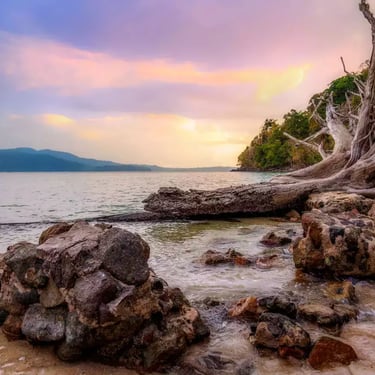Rangat
Rangat Island, located in the Middle Andaman region of the Andaman and Nicobar Islands, is a serene destination known for its lush green landscapes, pristine beaches, and eco-tourism attractions. Ideal for nature lovers, Rangat offers picturesque spots like Amkunj Beach, Moricedera Beach, and the scenic Dhani Nallah Mangrove Walkway. The island is perfect for a peaceful getaway, away from crowded tourist hubs. Easily accessible by road and ferry from Port Blair, Rangat Island is a hidden gem in the Andaman Islands that blends natural beauty with sustainable tourism.






Rangat
Inform visitors about your business location and working hours.
Address
3721 Single Street, Quincy, MA 02169
Hours
9am - 6pm
What is Rangat Known For ?
Rangat Island is known for its untouched natural beauty, tranquil beaches, and diverse eco-tourism opportunities. Famous for its pristine beaches like Amkunj Beach and Moricedera Beach, Rangat offers an ideal destination for beach lovers, nature enthusiasts, and adventure seekers. The island is also recognized for its unique mangrove forests, particularly the Dhani Nallah Mangrove Walkway, where visitors can walk through lush green mangroves and witness vibrant wildlife.
Pristine Beaches – Famous for Amkunj Beach and Moricedera Beach, perfect for relaxation and beach activities.
Dhani Nallah Mangrove Walkway – A unique wooden boardwalk through dense mangrove forests, ideal for nature walks and bird watching.
Cuthbert Bay Beach – Known for turtle nesting sites, making it a great spot for eco-tourism and wildlife enthusiasts.
Rangat Waterfall – A serene, hidden waterfall surrounded by lush tropical forests, perfect for nature lovers and photography.
Rich Biodiversity – Home to diverse flora and fauna, including rare bird species and marine life, ideal for eco-tourism and wildlife exploration.
Eco-Tourism Destination – A haven for travelers interested in sustainable tourism, offering eco-friendly experiences.
Tranquil Atmosphere – A peaceful island, away from crowded tourist spots, perfect for a serene getaway.
Nature Trails and Trekking – Various trekking routes for adventure enthusiasts to explore Rangat’s lush landscapes and untouched natural beauty.



Ways to reach Rangat Island
How to Reach Rangat Island: Complete Travel Guide
Rangat Island, a serene destination in the Andaman and Nicobar Islands, is accessible via air, sea, and road. Here's your complete guide on how to reach Rangat Island, including all the transport options:
1. Reach Port Blair
From Port Blair to Rangat: Once you arrive at Port Blair, you can reach Rangat by ferry or road.
2. By Ferry (From Port Blair)
Ferry Service: Regular ferries and catamarans run between Port Blair and Rangat Island. The ferry ride takes approximately 4 to 6 hours, offering scenic views of the Andaman Sea.
Booking Ferries: Ferries can be booked at the Port Blair Harbour or online through the Andaman and Nicobar Administration website.
Departure: Ferries usually depart from the Phoenix Bay Harbour in Port Blair.
3. By Road (From Port Blair to Rangat)
Distance: Rangat is about 140 km from Port Blair by road.
Travel Time: The drive takes approximately 4 to 5 hours, passing through scenic coastal roads and lush landscapes.
Transport Options: You can travel by private taxis, buses, or shared jeeps from Port Blair to Rangat.
Road Route: The route via National Highway 223 is the most commonly used and provides easy access to Rangat.
4. By Private Yacht/Boat
For those seeking a more exclusive and leisurely journey, a private yacht or boat charter can be arranged from Port Blair to Rangat Island. This option offers a more comfortable and personalized experience, ideal for those looking for luxury travel.



Do's & Don'ts in Rangat Island
Do’s:
Respect Nature and Wildlife
Do observe and enjoy the natural beauty of Rangat, including its beaches, forests, and wildlife, but maintain a safe distance from animals and marine life.
Do carry trash back with you, as there are limited waste disposal facilities, especially on remote beaches.
Take Care of the Beaches
Do make use of designated beach cleanup programs and contribute to keeping the beaches clean.
Use biodegradable sunscreen and avoid littering on the beaches or in the water.
Stay Hydrated and Prepared
Do carry enough water, sunscreen, and insect repellent for outdoor activities, as the climate can get humid and hot, especially during the day.
Do carry a first aid kit in case of minor injuries during outdoor activities.
Respect Marine Life
Do practice responsible snorkeling and diving by not touching coral reefs or disturbing underwater life. Use reef-safe products.
Stay Safe While Swimming
Do swim only in designated areas with lifeguards, especially in remote or lesser-known beaches.
Don'ts:
Don't Litter
Don't leave any waste on the beaches, in the forests, or in the water. Avoid using plastic and opt for reusable items instead.
Don't Disturb the Wildlife
Don’t approach or feed animals, including monkeys and birds, as this can disrupt their natural behavior.
Avoid touching or handling marine life like sea turtles or coral, which are sensitive and may be harmed.
Don’t Engage in Water Sports Without Safety Gear
Don’t venture into water sports or snorkeling activities without proper safety equipment or training.
Don’t Visit Protected Areas Without Permission
Some areas in Rangat, such as turtle nesting beaches or certain forest regions, are protected. Don’t enter these zones without permission or guidance from authorities.
Don’t Disregard Local Culture
Don’t engage in inappropriate or disrespectful behavior towards the indigenous communities. Dress modestly when visiting local villages and religious sites.
Don't Take Shells or Coral
Don’t collect or remove shells, coral, or other natural materials from the beaches. These are vital parts of the ecosystem and should remain undisturbed.




